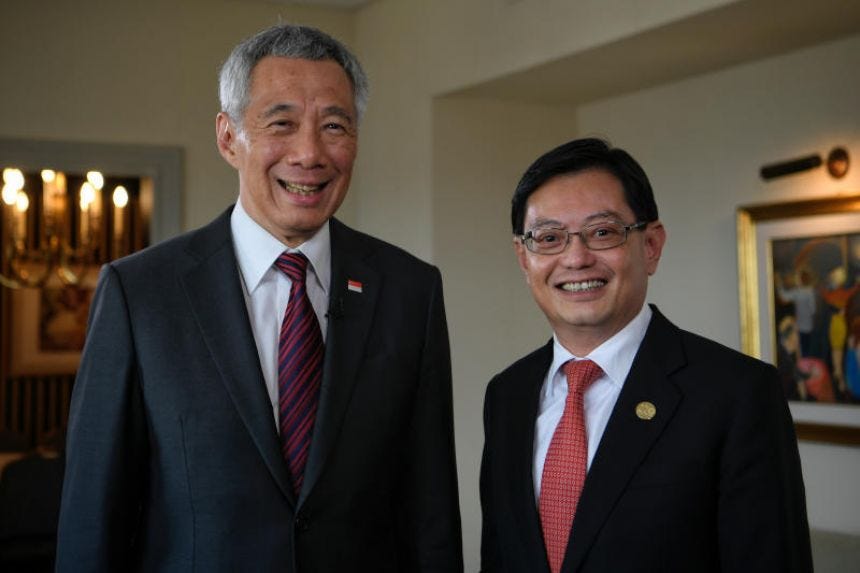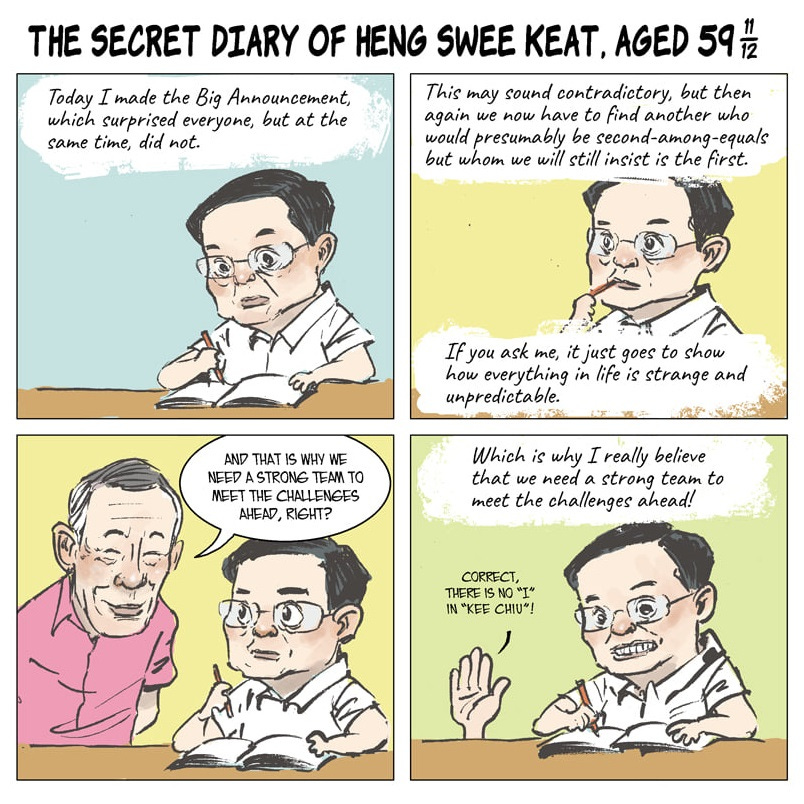[ad_1]

The sudden decision by Deputy Prime Minister Heng Swee Keat (above) to step down from the succession to become the country’s next prime minister, officially because at 60 he is too old to succeed the 69-year-old Prime Minister Lee Hsien Loong, has raised confusion and intense speculation on who will replace him to become the country’s next leader.
Except for an interregnum from 1990 to 2004 when Goh Chok Tong held office under the watchful eye of modern founder Lee Kuan Yew as “minister mentor,” the Lee family has dominated politics for the entire 62 years since independence in 1959. The process of selecting a new leader has thus been a good deal more fraught than for other countries.
The strait-laced government has followed a careful, rules-laden succession process, leading to questions over Heng’s April 8 announcement that he would no longer be the Lion City’s next prime minister, a job for which he was anointed two and a half years ago, generating theories that the present leadership wanted someone else.
The idea that Heng voluntarily stepped down has been met with skepticism. He had been groomed for leadership in the PAP’s rigid system, serving as managing director of the Monetary Authority of Singapore, the country’s central bank, before successively serving as education minister and coordinating minister for economic policy, as well as PAP assistant secretary-general—all prestigious positions that led to his becoming deputy prime minister in 2018. Even the pro-government Straits Times quoted an unnamed former minister in a story on April 9 saying, “The (announcement) was quite sudden, and frankly, I don’t know if that is the full story.”
Lee Hsien Loong’s estranged brother Lee Hsien Yang was impelled to post the following cartoon on his Facebook page, questioning Heng’s decision.

Guesswork on Heng’s replacement centers on Chan Chun Sing, a former major general and army chief of staff who left the military in 2011 to run for office. He is now minister for trade and industry as well as minster-in-charge of public service and is said to be Lee’s preferred successor although he is not widely popular within the ruling People’s Action Party or even among some Singaporeans.
Chan lost out to Heng as the future PM-apparent in an internal party selection process two and a half years ago. According to PAP practice, the next generation of ministers and office holders select from among themselves their next leader. An online petition, “Say no to Chan Chun Sing for PM!” has garnered more than 4,300 signatures in the few days since it started.
Besides Chan, other possible candidates include Transport Minister Ong Ye Kung and Education Minister Lawrence Wong. Heng’s departure has boosted speculation that Prime Minister Lee’s son Hongyi may enter politics although the 33-year-old Hongyi denied interest in public office on Facebook in June 2017.
Heng hinted Lee Hsien Loong may possibly remain Prime Minister for roughly five more years in a letter to Lee on April 8 which said, “This year, I am 60. As the (Covid-19) crisis will be prolonged, I would be close to the mid-60s when the crisis is over. The 60s are still a very productive time of life. But when I consider the ages at which our first three prime ministers took on the job, I would have too short a runway should I become the next prime minister then. We need a leader who will not only rebuild Singapore post-Covid-19, but also lead the next phase of our nation-building effort.”
Earlier, the 69-year-old Lee said he would step down as Prime Minister by the time he turns 70, but after the onset of Covid-19 early last year, he said he would remain prime minister longer in order to manage the pandemic. His father, Lee Kuan Yew, ruled the country for 31 years from 1959 to 1990 before stepping down voluntarily at the age of 67. Lee Kuan Yew’s successor Goh Chok Tong quit at the age of 63 in 2004.
“DPM Heng stepping down as the designated successor to the PM in a time of major economic challenges to our country does not augur well for Singapore,” said Francis Yuen Kin Pheng, secretary general of the opposition Progress Singapore Party (PSP), on Facebook. “We are concerned that it will shake the confidence of Singaporeans and foreign investors.”
Lee, however, sought to reassure concerns over the effect on Singapore’s reputation as an Asian financial hub, saying at the press conference: “The same ministers are still there. I’m still the PM, Swee Keat is still the DPM. And they will be dealing with the same people and that’s what matters to them if you take the two, three, four-year point of view, which in diplomacy is quite a long time.”
At the press conference, Warren Fernandez, chief editor of the Straits Times, said many will be “bewildered at this sudden rethink,” since the factors of age and health cited by Heng for not becoming premier were already known, even when Heng was anointed two and a half years ago. In 2016, Heng collapsed with a stroke and might have died had he not received timely treatment.
Terry Xu, the chief editor of the Online Citizen, a local news portal, posted on his Facebook on April 8, “60-year-old politician says too old to take up Premiership while 69-year old incumbent stays in position. Kind of a messed-up succession plan.”
“You mean when Heng Swee Keat took up his role as Deputy Prime Minister two years ago, he never thought of the concerns that he is having today?” Xu wrote.
Heng’s health is not the only concern, as Prime Minister Lee has his own health issues, having survived cancer twice.
Lim Tean, the founding leader of the opposition party People’s Voice, said on his Facebook on April 8, “Heng Swee Keat’s reason for relinquishing the leadership of the so-called 4G Team must be the lamest any politician can possibly come up with.”
“Let’s look at Heng Swee Keat’s reason for stepping aside. He cites his age. He says he is 60 this year and doesn’t have enough time to grow into the role of an effective PM,” said Lim, pointing out Deng Xiaoping was 74, Ronald Reagan was 69 and Winston Churchill was 65 when they became leaders of China, the US and UK respectively. So Heng Swee Keat, it is not about age.”
Even Singapore’s next generation leadership viewed the disruption of the succession negatively. “This unexpected turn of events is a setback for our succession planning. We recognize that Singaporeans will be concerned,” 32 office-holders including ministers said in a joint statement on April 8.
Lee said a cabinet reshuffle will be announced in two weeks, which will see Heng relinquish his position as Finance Minister. Lee added there will be “consequential moves” in other ministries.
The timing of Heng’s resignation as Finance Minister is “curious” since Singapore is still in the midst of economic turbulence due to Covid-19, wrote Tan Tee Seng, who was detained in 1987 in Operation Spectrum, allegedly to foil a Marxist conspiracy, on his Facebook page. “My curiosity is heightened when you consider the change taking place in Temasek Holding(s). Just two months ago, it announced that chief executive Ho Ching will retire from Temasek and step down from its board on 1 Oct 2021, after 17 years in charge.”
With Singapore’s succession thrown into uncertainty, former Singapore Prime Minister Goh Chok Tong’s jibe at former Malaysian Prime Minister Mahathir Mohamad may haunt him. Goh said on Facebook on February 24, 2020, “It is a privilege for a septuagenarian to be able to enjoy nature and the simple pleasures of life, unlike nonagenarian Mahathir. We got our politics right and our planned political succession is proceeding smoothly.”
This article is among the stories we choose to make widely available. If you wish to get the full Asia Sentinel experience and access more exclusive content, please do subscribe to us.
[ad_2]
Source link